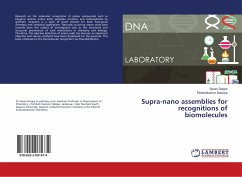The development of synthetic receptor for cation and anion recognition have attracted considerable attention in recent years within the field of supramolecular chemistry due to the fact that a large number of biological processes involve molecular recognition.The leading issue in the design of any active chemosensor is the connotation of a selective molecular recognition event with a physical signal highly sensitive to its occurrence. Fluorescence technique is commonly considered superior than other electrochemical techniques because of its low detection limits for trace chemical detection, selectivity, response time and in situ monitoring ability. Fluorescent chemosensors capable of selectively recognizing cations have potential analytical applications in many different fields, including chemistry, biology, and medicine. Calix[4]arene based chemosensors have enthralled a great deal of contemplation due to their capacity to visually sense analytes with high sensitivity as well asfast response time.
Bitte wählen Sie Ihr Anliegen aus.
Rechnungen
Retourenschein anfordern
Bestellstatus
Storno

![Lower rim calix[4]arene fluoroionophore for detection of ions - Sutariya, Pinkeshkumar;Patel, Rinku;Darjee, Savan Lower rim calix[4]arene fluoroionophore for detection of ions - Sutariya, Pinkeshkumar;Patel, Rinku;Darjee, Savan](https://bilder.buecher.de/produkte/42/42280/42280475n.jpg)
![Functionalised calix[4]arene fluoroionophore for detection of ions Functionalised calix[4]arene fluoroionophore for detection of ions](https://bilder.buecher.de/produkte/42/42061/42061841m.jpg)
![Lower Rim Functionalised calix[4]arenes Lower Rim Functionalised calix[4]arenes](https://bilder.buecher.de/produkte/35/35506/35506986n.jpg)

![Calix[4]arene based ion-selective electrodes Calix[4]arene based ion-selective electrodes](https://bilder.buecher.de/produkte/45/45354/45354132n.jpg)
![Synthesis, Characterization and Application of calix[4]arene dyes Synthesis, Characterization and Application of calix[4]arene dyes](https://bilder.buecher.de/produkte/45/45051/45051068n.jpg)
![Functionalized lowerrim calix[4]arene and its application Functionalized lowerrim calix[4]arene and its application](https://bilder.buecher.de/produkte/49/49015/49015463n.jpg)
![Introduction to calix[4]arene as modern applicable supramolecule Introduction to calix[4]arene as modern applicable supramolecule](https://bilder.buecher.de/produkte/47/47345/47345875n.jpg)